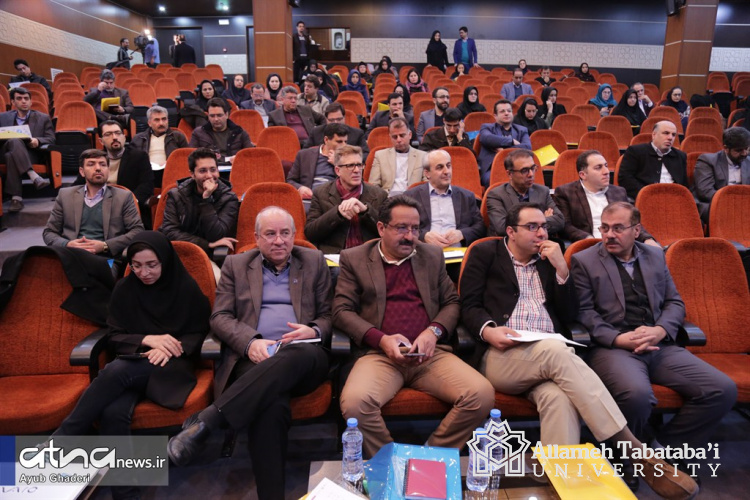National Seminar on Internationalisation of HE in Iran
National Seminar on Internationalisation of HE in Iran

Directorate for International Academic Cooperation
On Wednesday 7 February 2018, ATU held the first National Seminar on Internationalisation of Higher Education in Iran (IHEI) in partnership with universities of Shiraz, Ferdowsi (Mashhad), Shahid Chamran (Ahvaz), Kurdistan, and Sistan and Baluchestan. The Seminar included six panels where directors of International Academic Cooperation from six Iranian universities presented their papers on the relevant issues in the field.
In a seminar on Internationalisation of Higher Education in Iran (IHEI) held in ATU Faculty of Management and Accounting, Dr Omid Azadi, Director of International Academic Cooperation at Shiraz University; Dr Azra Ghandeharioun, Deputy Director for International Academic Cooperation at Ferdowsi University of Mashhad; Dr Khalil Gholami, Faculty Member at University of Kurdistan; Dr Mohammad Reza Ghasemi, Director of International Academic Cooperation at University of Sistan and Baluchestan; Dr Yadollah Meralizadeh and Dr Abdolhadi Darzian Azizi, Faculty Members at Shahid Chamran University of Ahvaz; and Dr Mandana Tishehyar, Director of International Academic Cooperation at Allameh Tabataba'i University presented their papers on "Globalisation and Internationalisation", "International Strategic Planning", "Internationalisation of HE and Iran's Scientific Diplomacy", "IRO (International Relations Offices) Models and Services", "International Networking Opportunities", "Shahid Chamran University's Business Plan" and "Fundraising and Project Management", respectively.

The seminar started with a speech of welcome delivered by Dr Hamidreza Oloumiyazdi, ATU Vice-President for Research; he emphasised the importance of student and staff exchange and holding international conferences and seminars, saying: "Scientific Diplomacy is the most effective means for public diplomacy, and universities, as the least political institutes, are the most important pillars for the development of scientific diplomacy in the world today." Referring to the recommendations in Islam regarding the acquisition of knowledge "even from so far a place as China", he pointed out that "Internationalisation is no longer a choice, but it is a must." Oloumiyazdi then pointed to the need for systematic movement in the path toward internationalisation and said it is a two-way process.

The seminar then continued with a short speech delivered online by Dr Roberto Escarre, Director of International Academic Cooperation at Universidad de Alicante (UA), about the nature of the IHEI Project and the national conference. The first specialised session started at 9:30 with Dr Azadi talking about the similarities and differences between globalisation and internationalisation, and different models thereof. Then, delimiting the broad term internationalisation to the field of education and science, he provided several practical "how-to" solutions toward successful internationalisation of higher education and improving the quality of education. In another session, Azadi addressed the audience on Branding and Marketing where he defined the core concepts and provided strategies for attaining the objectives, putting emphasis on improving the university websites, applying the potentials of media in marketing the brand, and investing in sports, cultural events, and activities.


The second speech was delivered by FUM representative, Dr Azra Ghandeharioon, on the subject of International Strategic Planning. She first introduced strategic planning and its fundamental elements, and introduced some best practices in the field. Then she introduced the strategic indicators in internationalisation of HE in Iran, including the national, regional and international upstream documents and marketing, and counted a series of strategies to achieve an appropriate strategic plan. Ghandeharioon continued her speech with introducing the specific strategies applied in FUM and closed her presentation with the shoulds and the shouldn"ts of strategic planning.

The seminar was continued with a presentation by Dr Khalil Gholami, Faculty Member at University of Kurdistan, on Internationalisation of Higher Education and Science Diplomacy in Iran. Gholami started his speech with the two opposite ends of the spectrum: Hegemony Theory and Cooperation Theory. Outlining his presentation in three broad sections, Dr Gholami pointed to the inevitability of globalisation in the world today and its role as a platform for internationalisation. Then he mentioned the important role of higher education in the contemporary world and provided evidence for this importance, including the emphasis laid on it by the UN, and clarified different types of internationalisation in the HE field. Dr Gholami's presentation ended with his elaborations on the topic of science diplomacy and discussed the inter-relations between science, technology and diplomacy and their role in "bridging the world through science and technology".

Dr Mohammadreza Ghasemi, Director of International Academic Cooperation at University of Sistan and Baluchestan then delivered a speech on International Relations Offices (IRO) Models and Services. He provided examples where emphasis is laid on the development of higher education, including Islamic Republic of Iran's Constitution and the Master Scientific Plan, and counted a series of forces which drive universities toward internationalisation. Dr Ghasemi continued with specifying the criteria for appropriate IROs, their staff, as well as all university's administrative and academic staff. The presentation also included schematic representation of some processes in USB's IR Office.

Prof. Yadollah Mehralizadeh, faculty member from Shahid Chamran University of Ahvaz (SCU) was the fifth speaker of the Seminar, presenting his paper on Strategic Plan for Internationalisation of SCU (2018-2022). Introducing the SCU's Strategic Plan members, he explained about the differences and overlaps between Business Plan, Strategic Plan, and Master Plan. Then he described the process of preparing SCU's SP and closed his speech with seventeen practical and sophisticated requirements for SCU's SP.

SCU had another speaker in the Seminar, speaking about SCU's International Business Plan. In this session, Dr Abdolhadi Darzian Azizi, SCU faculty member, first introduced different types of Plan and specified various steps toward preparing a business plan for a university. He then offered statistics about the state of higher education internationally and locally and clarified the aims and benefits of internationalisation of HE according to a definite strategic plan and business plan. Dr Darzian Azizi then named a number of important factors in preparing the business plan, including quality assurance, management and staff, risk analysis, fundraising and securing the required resources, financial estimation, and time schedule for implimentation of the internationalisation plan.

The last, though lot the least, speech was presented by Dr Mandana Tishehyar, ATU Director of International Academic Cooperation on Fundraising and Project Management. Dedicating a vital role to investing on HE, she specified different steps toward successful fundraising, including analysis, creating a record of the existing international projects, preparing a list of international sponsors, finding an appropriate sponsor for the project, and implementation. Then, providing further details in the form of flowcharts and tables, Dr Tishehyar clarified various procedures and strategies for defining and implementing an international project. She concluded her speech with introducing a number of useful links to European Commission's Erasmus+ Projects Application page.

The Seminar finished with the participants exchanging business cards and networking with each other. The powerpoint presentations presented in this programme are available from the link below:


